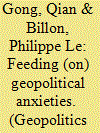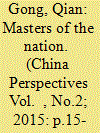| Srl | Item |
| 1 |
ID:
133111


|
|
|
|
|
| Publication |
2014.
|
| Summary/Abstract |
This paper analyses the role of news media in (re)producing geopolitical narratives of food insecurity in relation to the 2007-2008 global food price spike. News content and textual analysis suggests that the media's representation of the food price spike is partly framed by Western geopolitical anxieties of the 'threatening rise of Asia', and features 'fast growing' Asian appetites among the main culprits of the crisis. Seeking to explain the widespread circulation of such representation, this paper analyses media-source relationship within the context of market-driven journalism, and suggests that the changing role of news media has in turn contributed to a rapid and uncritical circulation of elite-based interpretation of, and neoliberal geopolitical approach to, food security. The paper points at the importance of critical enquiries into geopolitical representations of food insecurity and of opening media space for a 'counter-geopolitics of food security'.
|
|
|
|
|
|
|
|
|
|
|
|
|
|
|
|
| 2 |
ID:
139301


|
|
|
|
|
| Summary/Abstract |
Cinema, an extremely popular and useful cultural form during the Maoist era, played a big role in shaping working class subjectivity. This article argues that despite their highly politicised and formalised content, industrial-themed films made during the Cultural Revolution created a “masters of the nation” subjectivity that still resonates with workers who grew up watching these films. In doing so, this article brings together two bodies of scholarship that rarely make reference to one another: filmmaking in the Cultural Revolution period and post-Mao workers’ subjectivity. Post-Mao scholarship has gone beyond simply dismissing films from the Cultural Revolution period as crude propaganda designed to create a highly politicised mass mind. It has drawn our attention to the more complicated nature of this body of filmmaking, particularly the “model play” films. However, new features made during the Cultural Revolution are often seen as “too ideological” to warrant academic attention. This paper attempts to find out how the “masters of the nation” discourse still resonates with workers who grew up watching these films. It argues that, despite the valorisation of workers as the privileged class and an excessive focus on class struggle, these films have indeed endowed the subaltern with the kind of agency that is lacking in contemporary media representations of workers.
|
|
|
|
|
|
|
|
|
|
|
|
|
|
|
|